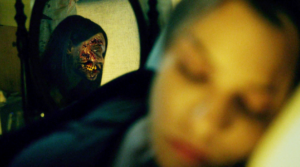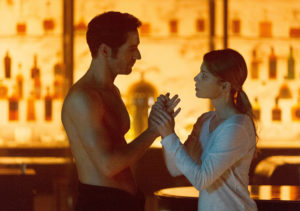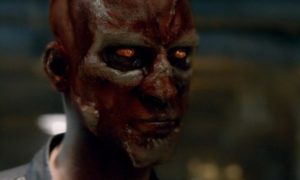 In “Sweet Kicks,” Lucifer spends the entire episode diving headlong into danger to experience the exhilaration of his newfound feeling of mortal vulnerability. “The danger of getting hurt is positively thrilling,” Lucifer remarks with a grin. Immersing himself in the peril produced by LA gangbangers, the Devil plays the loose cannon cop beside the uptight Detective Chloe Decker. By the end of the episode, Lucifer—much to Chloe’s chagrin—utters with a sardonic smile, “I’m now an official civilian consultant for the LAPD,” which I suppose means that the police procedural element of the Lucifer show is officially here to stay.
In “Sweet Kicks,” Lucifer spends the entire episode diving headlong into danger to experience the exhilaration of his newfound feeling of mortal vulnerability. “The danger of getting hurt is positively thrilling,” Lucifer remarks with a grin. Immersing himself in the peril produced by LA gangbangers, the Devil plays the loose cannon cop beside the uptight Detective Chloe Decker. By the end of the episode, Lucifer—much to Chloe’s chagrin—utters with a sardonic smile, “I’m now an official civilian consultant for the LAPD,” which I suppose means that the police procedural element of the Lucifer show is officially here to stay.
“Sweet Kicks” was for the most part uneventful, although there was an interesting exchange between Chloe and Lucifer which was quite evocative of the Lucifer comic. Chloe observes that Lucifer likes creating chaos and subsequently taking control because it provides a power trip. “It’s like you’ve got some kind of God complex,” Chloe remarks, which elicits Lucifer’s indignant retort, “I most certainly do not.” It was rather reminiscent of Mike Carey’s Lucifer, who prides himself on being unlike his Father (“I have nothing in common with Yahweh”1), although Ellis’ Lucifer appeared more an insulted child than Carey’s raging demigod.
 Mazikeen was a notable presence in episode 5 of Lucifer, singlehandedly pulverizing a roomful of gun-toting gangbangers (much to Lucifer’s delight) and even allowing us to catch a glimpse of the deformed half of her face, hitherto hidden in plain sight. Most significantly, Maze begins to conspire with Amenadiel to get Lucifer back to Hell, which Lucifer’s demonic bodyguard feels is in the Devil’s best interest. Maze points Amenadiel in the direction of Dr. Martin, Lucifer’s new confidante. Amenadiel proceeds to tempt Linda for information about his rebellious brother, using the same angelic sexual charm the libidinous Linda has already fallen prey to via the fallen angel. Interestingly, Amenadiel lies to Linda about his identity, claiming to be a fellow therapist, whereas Lucifer, of course, never lies and is open and honest about who he is. Amenadiel’s duplicity underlines the deep ambivalence of the angelic host.
Mazikeen was a notable presence in episode 5 of Lucifer, singlehandedly pulverizing a roomful of gun-toting gangbangers (much to Lucifer’s delight) and even allowing us to catch a glimpse of the deformed half of her face, hitherto hidden in plain sight. Most significantly, Maze begins to conspire with Amenadiel to get Lucifer back to Hell, which Lucifer’s demonic bodyguard feels is in the Devil’s best interest. Maze points Amenadiel in the direction of Dr. Martin, Lucifer’s new confidante. Amenadiel proceeds to tempt Linda for information about his rebellious brother, using the same angelic sexual charm the libidinous Linda has already fallen prey to via the fallen angel. Interestingly, Amenadiel lies to Linda about his identity, claiming to be a fellow therapist, whereas Lucifer, of course, never lies and is open and honest about who he is. Amenadiel’s duplicity underlines the deep ambivalence of the angelic host.
The most exciting moment of the latest episode of Lucifer, it must be said, was the preview for the following week’s episode, “Favorite Son,” which seemed to hint at the search for Lucifer’s severed wings—one of the great storylines of the Lucifer comic.2 Lucifer’s “The House of the Windowless Rooms” arc was, in my opinion, when the comic truly found itself, and I can only hope that the show will undergo a similar transformation.
Notes
1. Mike Carey, Lucifer: The Divine Comedy (New York: DC Comics, 2003), p. 126.↩
2. See Mike Carey, Lucifer: Children and Monsters (New York: DC Comics, 2001), pp. 1–92.↩




